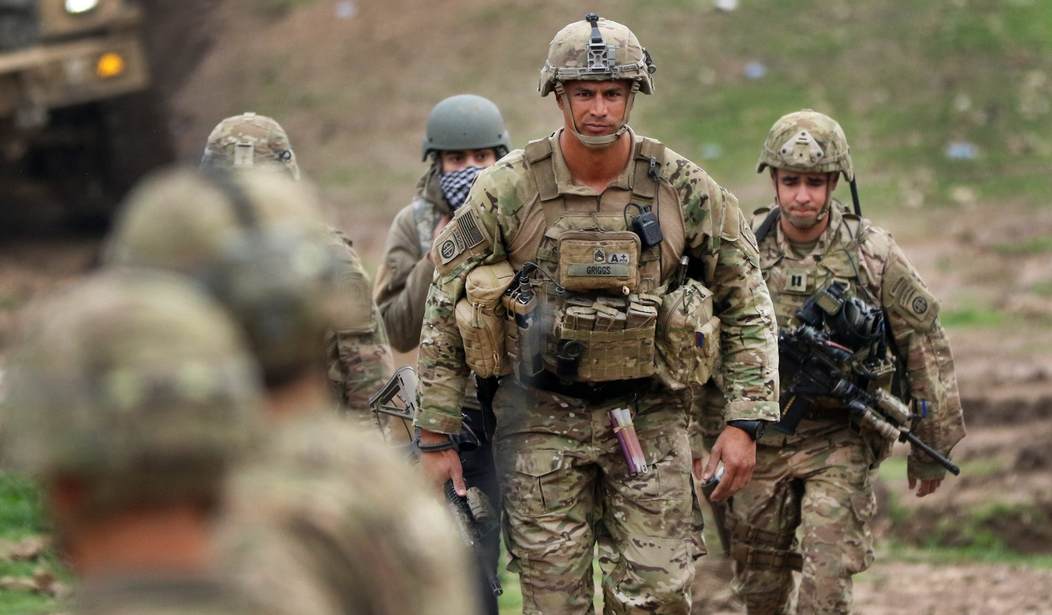WASHINGTON – Stretched thin after 15 years of continued conflict, the U.S. is not currently capable of maintaining a modern and effective military against the Islamic State, Sen. John Cornyn (R-Texas) said Wednesday.
“To address these threats, to maintain the peace, and fight if we must, we have to maintain a capable, ready, and modern military, and the truth is, we’re not ready,” the majority whip said during an appearance at the Wilson Center. “And while I believe America will always rise to the challenges, once roused from our national complacency, it makes a dangerous world even more dangerous.”
President Trump in March proposed a $54 billion hike in defense spending, which would support forces against ISIS in Syria and Iraq. Last week, the president freed the Pentagon from Obama-era troop limit restrictions imposed on conflicts in Syria and Iraq, potentially opening the door for troop increases. U.S. strategy has been to support local military units against ISIS.
Cornyn said the military has been bogged down by blanket restrictions on discretionary defense spending and a lack of a coherent national security strategy, with military modernization suffering from a myopic view on financial challenges and deferred investment.
“You better believe our enemies, not hamstrung by red tape and regulations, take full advantage of our reluctance to deal with this on a bipartisan basis,” Cornyn said.
Even if ISIS is pushed backed in Iraq, Cornyn said the group’s “ideology spreads like a contagion through their so-called ‘cyber-caliphate,’ and continues to permeate the West and attract the vulnerable and disillusioned.”
U.S. military and partner forces this week carried out 18 strikes on ISIS targets in Syria and nine strikes on ISIS in Iraq, according to the U.S. Department of Defense. The attacks in Syria destroyed eight ISIS fighting positions, while efforts in Iraq resulted in the destruction of two enemy fighting positions and various weapons and vehicle caches, according to a department announcement.
Cornyn on Wednesday also discussed the threat of North Korea, which has repeatedly provoked the United States while engaging in illegal nuclear and ballistic missile tests. Secretary of State Rex Tillerson, Secretary of Defense James Mattis and Director of National Intelligence Dan Coats on Wednesday briefed Congress on the matter, discussing President Trump’s order to reevaluate U.S. policy concerning the Democratic People’s Republic of Korea. In a joint statement, the group said it’s engaging international partners, including Japan and the Republic of Korea, to pressure North Korea to de-escalate its missile activities, which have totaled more than 60 tests and events in recent years. Chairman of the Workers’ Party of Korea Kim Jong-Un’s stated goal is to develop the capability to attack the United States.
“The United States seeks stability and the peaceful denuclearization of the Korean peninsula,” the trio said in a statement. “We remain open to negotiations towards that goal. However, we remain prepared to defend ourselves and our allies.”
“I don’t know what’s going to happen in North Korea,” Cornyn said. “But I’m hopeful, and I would dare say, Congress will be insistent on being involved in that process.”
Adm. Harry Harris, commander of U.S. Pacific Command, speaking before the House Armed Services Committee on Wednesday, suggested deploying missile interceptors in Hawaii so the U.S. can better defend itself against North Korean threats. Harris called North Korea, which this week threatened Australia with a nuclear strike, the most “immediate threat” to the United States and its allies in the Indo-Asia Pacific.
“In confronting the North Korean threat, it is critical that the U.S. be guided by a strong sense of resolve both publicly and privately in order to bring Kim Jong-Un to his senses, not his knees,” Harris said.








Join the conversation as a VIP Member